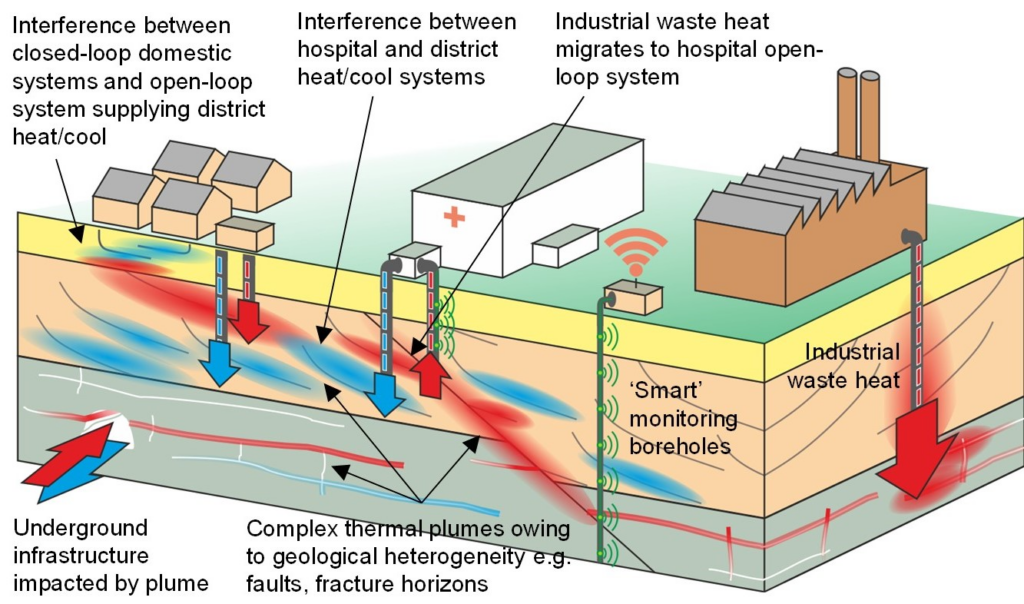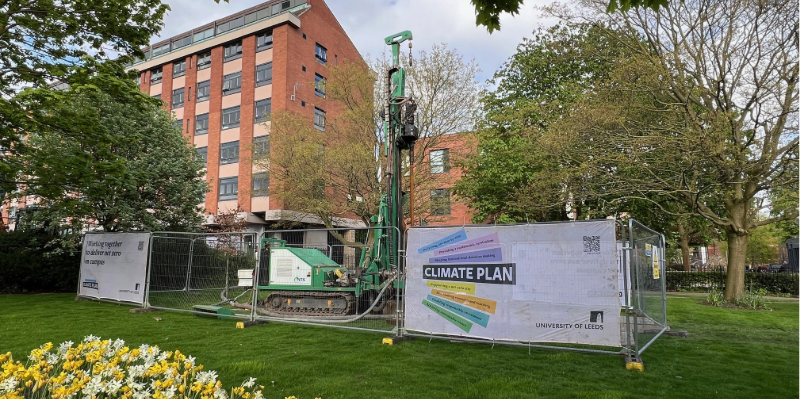Seismic characterisation and monitoring of urban geothermal reservoirs
Heating accounts for around half of global energy demand, with 75% of that supplied by fossil fuels. In the UK, heating buildings is responsible for ~20% of carbon emissions. Compared with the challenge of decarbonising heating, greening the supply of electricity has been relatively straightforward since the interventions required have not significantly impacted people’s lives. By contrast, we need innovative solutions to heating to minimise the degree of retrofitting needed to decarbonise heating systems in every UK building.
Geothermal energy is attractive for decarbonising heating/cooling systems in the urban environment. Many urban centres are underlain by potential geothermal reservoirs, offering storage and extraction options for excess heat and providing significant reductions in carbon demand. Nevertheless, the UK has been slow to explore geothermal heating solutions, owing to i) lack of knowledge about the geological and hydrological complexities of geothermal reservoirs, and ii) stakeholder concerns about the long-term sustainability, and thus cost-effectiveness, of geothermal heating (Figure 1). Any potential geothermal reservoir therefore requires extensive characterisation prior to development, and monitoring during usage to ensure sustainable management. Here, geophysical methods can be particularly powerful and in this PhD project, you will explore seismic methods for geothermal applications.

Building on any existing experience with seismology (including acquisition, processing and modelling), you will be free to explore seismic technologies that you feel would be beneficial for characterising and monitoring geothermal reservoirs and heating system. Such technologies may include, but are not limited to: controlled-source or ambient noise characterisations of reservoir structure; borehole seismology and the relation to well-logs and cores; and distributed acoustic sensing (DAS) and the development of fibre-optic seismology. You could also innovate in data processing and analysis technologies, for example in seismic velocity model building via waveform inversion or ambient noise tomography. Whichever discipline of seismology interests you, your supervision team has the expertise to support you through your research programme. We uniquely maintain many of the geophysical tools that you will need to undertake this research, including cutting-edge SmartSolo seismic nodes and a Febus Optics DAS system.
Research connections at the University of Leeds enable you to apply your developing expertise at a range of experimental geothermal sites. Of particular interest will be the University of Leeds’ own “Geothermal Campus”, a research facility established to explore the decarbonisation of university heating/cooling systems (Figure 2). The facility comprises 7 instrumented boreholes, variously compatible with thermal testing, water circulation and geophysical monitoring. In using this facility, you will join a growing group of researchers operating within the Leeds Geosolutions Centre. The supervision team is also involved with the UK government-funded SmartRes project, exploring barriers to the uptake of urban geothermal systems. Through this, you can access archive data and perform new acquisitions at sites including the British Geological Survey’s UKGEOS Cheshire observatory. Furthermore, we have emerging connections with the Gateshead Coal Authority, which aims to repurpose relict mine workings for heating operations.

As a PhD student in the YES Doctoral Training Network, you will benefit from a training environment that offers diverse schemes to boost your skills beyond technical expertise. Such schemes include academic writing to help you prepare the submission of research articles, and presentation skills to give you confidence in disseminating your work to international conference audiences. During your studies, you will be based in the Institue of Applied Geoscience (IAG) of Leeds’ School of Earth and Environment. With an active PhD research community, you will find a vibrant network of peer support. Furthermore, in working with the Geosolutions Centre, you will meet researchers not only developing technical solutions to energy transition problems, but also the policy solutions to implement technology for societal benefit: this represents a unique multi-disciplinary grouping that is unique for a UK research centre.
For your own background, you should be experienced in geophysics or a related quantitative discipline (e.g., physics, mathematics, computing). You should have a passion for translating theory into practical applications, with industrial and societal relevance. You will be guided in bringing your own ideas to your data analysis. Fieldwork is optional during this project: you may develop your own field approaches, or alternatively work with archive data. We welcome applications from anyone with relevant academic or industrial experience.
